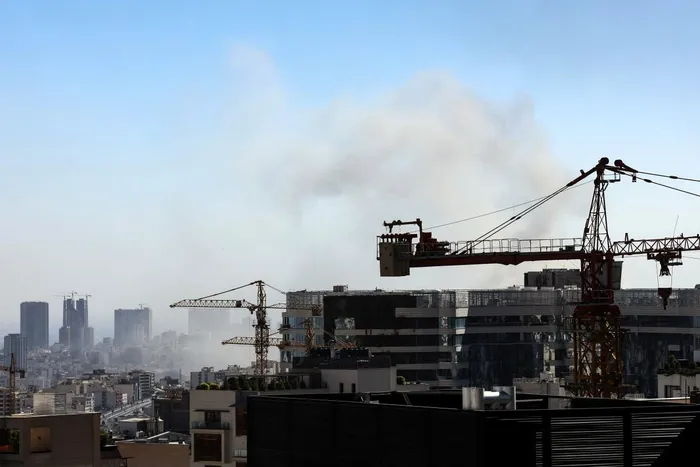US strikes on Iran escalate tensions in the Middle East

Smoke rises above buildings in Tehran following an Israeli strike.
Image: AFP
THE US’s surprise strikes on Iran at the weekend threaten to deepen the conflict in the Middle East after Israel also launched its own bombing campaign against Iran, with Tehran vowing to retaliate against US involvement.
In response to the US attack, Iran's armed forces said they targeted multiple sites in Israel including Ben Gurion airport, the country's main international gateway near Tel Aviv.
Israeli rescuers said at least 23 people were wounded.
Iran's Huthi allies in Yemen repeated their threat on Sunday to resume attacks in the Red Sea if Washington joined the war, saying they were ready to target US ships and military warships.
This was after President Donald Trump claimed total success for the operation in an address to the nation just hours after the attack, and Vice President JD Vance followed up on Sunday morning.
"We know that we set the Iranian nuclear program back substantially last night, whether it's years or beyond," he told ABC.
"We're not at war with Iran -- we're at war with Iran's nuclear program," he added. "The president took decisive action to destroy that program last night."
The UN's International Atomic Energy Agency said it had not detected any increase in radiation levels at the nuclear sites and Tehran said on Sunday there were no signs of contamination.
Israeli Prime Minister Benjamin Netanyahu hailed the US strikes, saying Trump's decision to "target Iran's nuclear facilities with the awesome and righteous might of the United States will change history."
The Israeli military was also checking the results of the US raid on the deeply buried nuclear facility in Fordo, with a spokesperson saying it was "too soon" to know if Iran had removed enriched uranium from the site.
US Defense Secretary Pete Hegseth said Trump "seeks peace, and Iran should take that path. "This mission was not, and has not been, about regime change."
"We devastated the Iranian nuclear program," Hegseth told a Pentagon press briefing, adding that the operation "did not target Iranian troops or the Iranian people."
Standing beside Hegseth, top US general Dan Caine said that "it would be way too early for me to comment on what may or may not still be there."
"Initial battle damage assessments indicate that all three sites sustained extremely severe damage and destruction," he told reporters.
The main US strike group was seven B-2 Spirit bombers flying 18 hours from the US mainland to Iran with multiple aerial refuelings, Caine said.
People gathered in the center of Tehran to protest against US and Israeli attacks, waving flags and chanting slogans, state TV showed.
Israel said it had launched fresh strikes on western Iran and in Qom, south of Tehran. Iran's official IRNA news agency reported four Revolutionary Guard members were killed in strikes on a military base in the city's north.
The United Arab Emirates, Qatar and Oman, which had been mediating Iran-US nuclear talks, criticized the US move and urged de-escalation.
The European Union called on all sides "to step back," while stressing Iran must not be allowed to develop nuclear weapons. President Cyril Ramaphosa called on the US, Israel, and Iran to give the United Nations the opportunity and space to lead on the peaceful resolution of the matters of dispute, including the inspection and verification of Iran's status of uranium enrichment, as well as its broader nuclear capacity.
The UN was set to meet over the latest attacks on Sunday.
The Iranian foreign minister said he would travel to Moscow for talks with Russian President Vladimir Putin on Monday.
Following his address, Trump warned Iran against retaliation. Iran and its proxies have previously attacked US military bases in Iraq and elsewhere in the region.
Cape Times